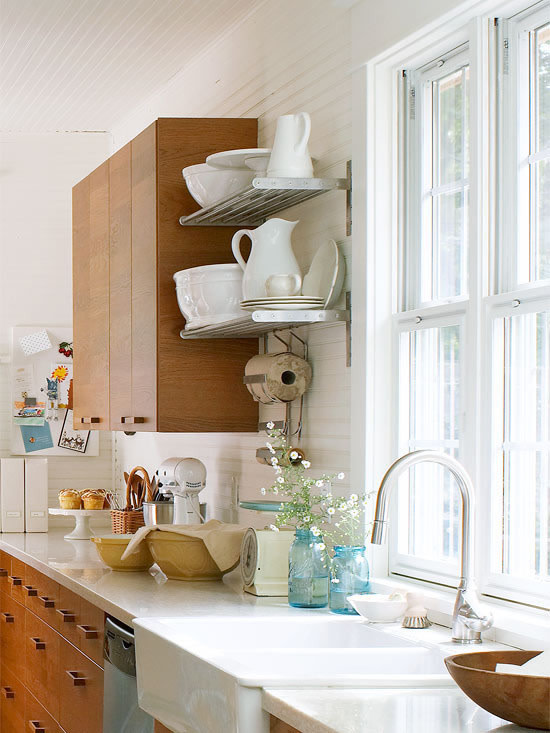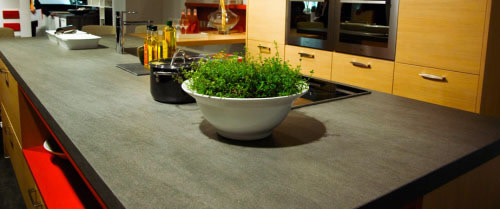Counter Notions

A solid surface countertop - molded resin, versatile and durable, tried and true.
A kitchen is only as good as its countertop. Or at least it can seem that way sometimes, especially as you’re wiping down the counter for the umpteenth time in a day. Other kitchen qualities are important, but the countertop is in some ways the core of the kitchen. It seems simple – all it needs to be is a flat – but beyond that minimum requirement are a plethora of possibilities. Color, texture, cost, durability... And if you hate your kitchen counters, well, that’s a good excuse not to cook at home – and that’s no way to live!
Countertops come in a wide range of surfaces, manmade and natural. Materials come and go in popularity, and new ones enter the market periodically. Is Neolith the new granite? What are people looking for these days? Most of our countertop needs haven’t changed over the years (easy to clean, attractive, long-lasting, durable), but environmental concerns are higher up on the list of priorities than they used to be. Which of course means not just toxicity of the material, but also how it was manufactured or harvested in the first place, and durability. Will it last forever? Good; that’s sustainable.
From the relatively inexpensive, tried and true laminates (like Formica, which is now 100 years old – read about it here) to high end, building boom-ubiquitous granite, to good old-fashioned wood and new-fangled bamboo, there are many choices. It can seem like too many choices. They all have their pluses and minuses. You have to consider what's most important to you, and what look you want. Wood is warm and rustic – a far cry from polished granite; laminates and manmade solid surfaces come in bright colors that natural materials don't.

Neolith, a newer porcelain countertop material, highly durable, and eco-friendly.
Image: Courtesy of Roomology
Will it stain, chip, crack, or scratch easily? Is it shiny but prone to showing fingerprints? Is it a continuous slab or does it reveal seams? Do you have to wax or seal or sand it down periodically? For any material, the answer to at least some of these questions will be yes. There is no "perfect" material, and nothing will stand up to everything. Online questionaires can help guide you to what material might best meet your own needs (take the Better Homes and Gardens countertop quiz).
Roughly in order of cost, from lower to higher, these are some of the countertop surfaces widely available.
Laminate - layers of paper coated with plastic and glued to plywood or fiberboard; can be patterned for abstract or natural looks, from 1950s era "boomerang" and "linen" to faux stone.
Solid surface - molded resin; can mimic stone, but comes in bright colors too. (DuPont's Corian, around for 40 years or so, is an example.)
Marble - a classic "real" material, but porous, so it stains easily.
Stainless steel and other metals - metal sheets, can be copper, pewter, or zinc. Sleek and ultra-hygienic but shows fingerprints and dents easily.
Concrete - needs to be sealed or waxed periodically; can be tinted to match color swatches.
Engineered or "cultured" stone, a.k.a. quartz-surface - 93% quartz particles (which actually are ground granite) mixed with resin and pigments; easy care, can come in bright colors.
Paper composite - paper pulp bonded with water-based resins; an eco-friendly material.
Soapstone - a natural and naturally porous stone, so it's prone to stains but also very stands up well to high heat.
Wood - solid hardwoods (usually maple, walnut, beech or cherry, and more recently, the fast-growing, highly sustainable bamboo) or "butcher block" (smaller pieces of hardwood glued together into a slab)
Limestone - a natural, sedimentary rock.
Granite - the go-to, high-end countertop since the '90s; very hard and durable. Some granites can contain high levels of radon.
Recycled glass - ground glass mixed into concrete; highly heat and scratch resistant, but might crack if you drop a really heavy pot on it.
Neolith - a new, high-tech porcelain slab made of natural clay, feldspar, silica and mineral oxides; very light and non-porous, and can be installed in a thin sheet. A recent addition to the U.S. market.




